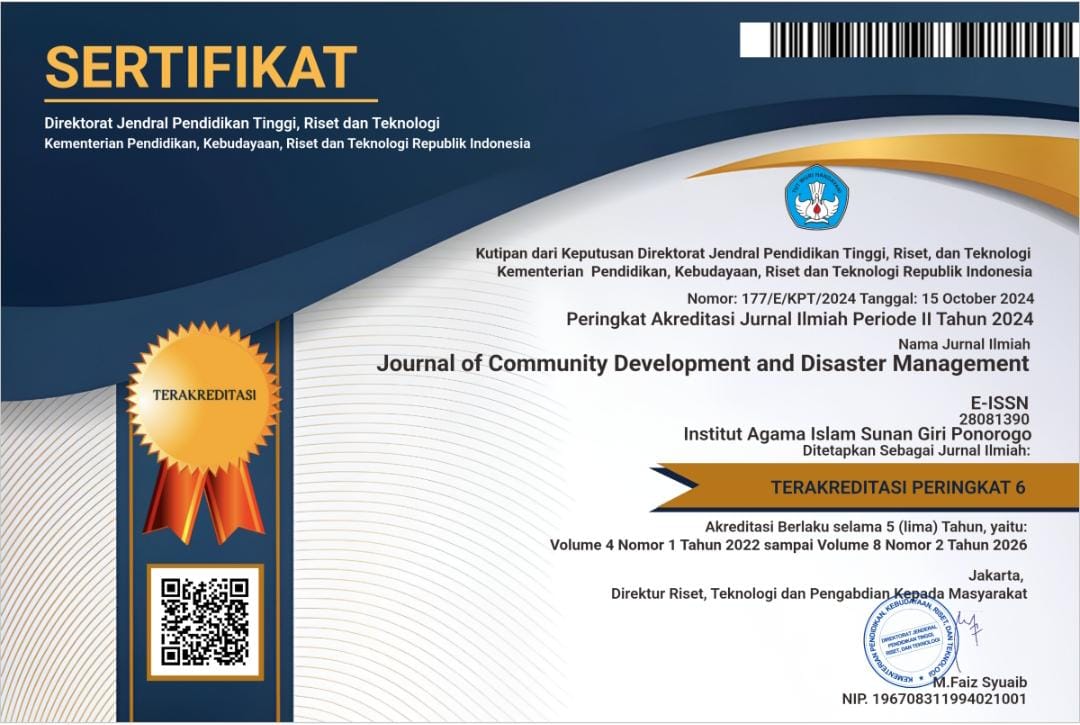MENAKAR KESADARAN PROFETIK ORGANISASI KEPEMUDAAN (Studi Tentang Manejemen Pengkaderan Pergerakan Mahasiswa Islam Indonesia Komisariat Sunan Giri Cabang Ponorogo Tahun 2018-2019)
DOI:
https://doi.org/10.37680/jcd.v2i1.987Keywords:
Profetik, Manajemen Pengkaderan, Pergerakan Mahasiswa Islam IndonesiaAbstract
Abstract
The diversity of patterns of prophetic awareness automatically shapes each different character, as well as organizational arrangements and strategies must also vary. Here, research on prophetic awareness in the management of the Indonesian Islamic Student Movement's cadre organization Sunan Giri Ponorogo Commissariat for 2018-2019 becomes significant to study. This study tries to describe management and cadre strategies in an effort to foster prophetic awareness of the cadres of the Indonesian Islamic Student Movement Commissariat Sunan Giri Ponorogo. To obtain the necessary data, interview, observation and documentation methods were used, while the subjects of this study were the commissariat management, including the chairman of the commissariat, secretary, deputy chairman of the organization and cadre. This type of research is descriptive qualitative. The result of this research is that the form of cadre management in PMII classifies there are three types, namely formal, non-formal and informal cadres. There are three aspects that must be emphasized in an effort to always foster prophetic awareness for cadres, namely the transcendent aspect, humanism, and liberation. The efforts made in order to foster prophetic awareness include: providing facilitation in the form of intense discussion rooms, conducting training/schools on a scale carrying out the yasinan routine every Friday night, habituation of congregational prayers. The obstacles include; many negative influences that lower the morale of the cadres. lack of organizational awareness in cadres c) lack of istiqomah cadres in carrying out the practice of Ubuddiyah. Solutions that can be sought are several approaches such as a structural approach, an emotional approach, and a personal approach.
Keywords: Prophetic, Cadre Management, Indonesian Islamic Student Movement
References
Alfas Fauzan, PMII DalamSimpul-simpulSejarahPerjuangan, (Jakarta: PB PMII, 2004)
Buku pedoman penulisan skripsi lembaga penelitian dan pengabdian masyarakat (LP2M) INSURI Ponorogo
HeddyShri Ahimsa Putra, ParadigmProfetikIslam,Epistemology, Etos, Dan Modelgadjahmada university Press,Yogyakarta, 2018
Hermawan, EmanMenjadi Kader Pergerakan: Dari SimpatisanMenjadi Kader Militan, Dari IndividuMenjadi Organizer, (Yogyakarta: KLINIK,2000)
Kuntowijoyo, IdentitasPolitikUmat Islam (Cet. I; Bandung: Mizan, 1997),
Kuntowijoyo, Muslim Tanpa Masjid, (Bandung: Mizan, 2001
Kuntowijoyo, Paradigma Islam: Interpretasiuntukaksi (Bandung: Mizan, 1999),
Kuntowijoyo, SelamatTinggalMitosSelamatDatangRealitas (Cet. I; Bandung: IKAPI,2002)
M. Dawam Raharjo, Ilmu Sejarah Profetikdan Analisis Transformasi Masyarakat dalam Kuntowijoyo, Paradigma Islam
Mas’ud Abdurrahman, MenujuParadigma Islam Humanis (Cet. I; Yogyakarta: GamaMedia, 2003),
MurtadhaMuthahari, Society and History.terj. M. Hashem, MasyarakatdanSejarah:Kritik Islam atasMarxismedanTeoriLainnya (Cet. V; Bandung: Mizan, 1995)
Sugiyono, meteodolgipeneletianpendidikan, (bandung :Alfabeta, 2006
Umam Chatibul, SekitarKelahiran PMII, dalam Muhammad FajrulFalah (penyunting), Citra Diri PMII,(Yogyakarta: Yayasan Patria Nusantara, 1988
Downloads
Published
How to Cite
Issue
Section
License
JCD: Journal of Community Development and Disaster Management rekomendasi pencipta untuk memegang hak cipta tanpa batasan dan batasan pencipta untuk memiliki hak publikasi tanpa batasan, juga pemilik hak komersial atas artikel tersebut adalah pencipta.











